六年级英语:牛津6A Unit 3知识点整理(教学实录)
牛津沪教版六年级上6A-Unit 3 知识点梳理 + 拓展阅读
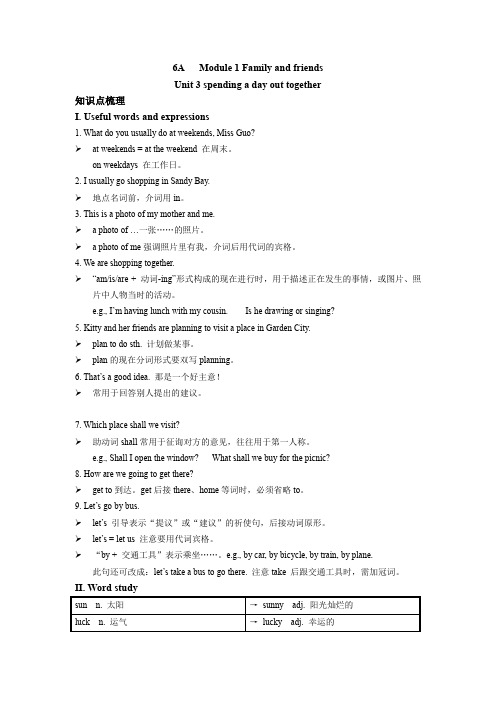
6A Module 1 Family and friendsUnit 3 spending a day out together知识点梳理I. Useful words and expressions1. What do you usually do at weekends, Miss Guo?at weekends = at the weekend 在周末。
on weekdays 在工作日。
2. I usually go shopping in Sandy Bay.地点名词前,介词用in。
3. This is a photo of my mother and me.a photo of …一张……的照片。
a photo of me强调照片里有我,介词后用代词的宾格。
4. We are shopping together.“am/is/are + 动词-ing”形式构成的现在进行时,用于描述正在发生的事情,或图片、照片中人物当时的活动。
e.g., I’m having lunch with my cousin. Is he drawing or singing?5. Kitty and her friends are planning to visit a place in Garden City.plan to do sth. 计划做某事。
plan的现在分词形式要双写planning。
6. That’s a good idea. 那是一个好主意!常用于回答别人提出的建议。
7. Which place shall we visit?助动词shall常用于征询对方的意见,往往用于第一人称。
e.g., Shall I open the window? What shall we buy for the picnic?8. How are we going to get there?get to到达。
6AU3知识点梳理分析

Unit 3(六年级第一学期牛津英语知识点梳理)打* 的仅供参考I 词组1.a map of …一幅…的地图2.a t weekends = at the weekend 在周末3.f ar away from 离…远4.o n Lucky Island 在幸运岛5.i n Sunny Town 在阳光城6.i n Spring Bay 在春天湾7.a photo of my family and m e一张我和我家人的照片8.h ave lunch 吃午饭9.S pace Museum 太空博物馆10.buy tickets 买票11.eat ice cream 吃冰淇淋12.bring sth. to sp.…把某物带到…13.photo album 影集14.play tennis/ football/ basketball/ badminton 打网球/踢足球/打篮球/打羽毛球15.have a picnic 吃野餐16.have a barbecue 吃烧烤17.have lunch 吃午饭18.have dinner 吃晚饭19.fly kites 放风筝20.ride bicycles 骑自行车21.make sandcastles 筑沙堡22.collect shells 拾贝壳23.plan a visit 安排一次旅行24.plan to do 计划做某事25.let sb. do sth. 让某人干某事26.which place 哪个地方27.what time 几点钟(问具体时刻)28.how about = what about 怎样,如何(后跟名词、动名词)29.at ten o’clock 在10点钟30.get there 到达那里31.by bus 乘公交车32.how much…多少钱(询问价钱)e back 回来II. 词性转换1.w eekend n. 周week n. 星期2.s unny adj. 睛朗的sun n. 太阳3.s andy adj. 沙质的sand n. 沙子4.l ucky adj.好运的;幸运的luck n. 运气,好运*unlucky adj.不幸的*luckily adv. 幸运地5.a ctivity n. 活动active adj. 积极的actor n. 男演员*actress n. 女演员*act v. 扮演/ n. 行动6.c ollect v. 收集*collection n. 收集III. 语言点/句型1.正确回答下列问题:a.D o you live near your school? →Yes, I do / No, I don’t.b.Is your house far away from our school? →Yes, it is. / No, it isn’t.c.Do you want an apple or orange? →I want an apple / orange..d.Are you from China or Japan? →I am from China.e.Can you speak English or French? →I can speak English.f.Have you been to Spring Bay or Sandy Bay?→I have been to Spring Bay / Sandy Bay. g.I s this a photo of your family or your class?→This is a photo of my family / my class.2.用适当介词填空:a.I usually share my food with my deskmate.b.I’ve got a lot of presents from my family andrelatives.c.Make a birthday card for one of your familymembers or relatives.d.This is a photo of my parents. They’reshopping.e.I usually play football with my sister atweekends.f.I have been to Canada. I went there in 2008.g.I have been in Shanghai for two years.h.Sandy Bay isn’t in Spring Bay. It’s far awayfrom Spring Bay.i.Seaside Town is on Lucky Island.j.Green Market is in Sunny Town.k.I have two tickets for the latest film. Do you want to go with me?l.Let’s buy another ticket for our teacher.m.A: What time on Sunday?B: How about ten o’clock in the morning? n.Let’s go by bus.o.T he first class begins at eight o’clock every morning.3.s pend的用法a.I t takes us about two hours to do ourhomework every day. (保持原意改写句子) →We spend about two hours on/ doing our homework every day.b.翻译句子: 每个月我花200元买书与杂志。
牛津英语6AUnit3复习提纲.docx
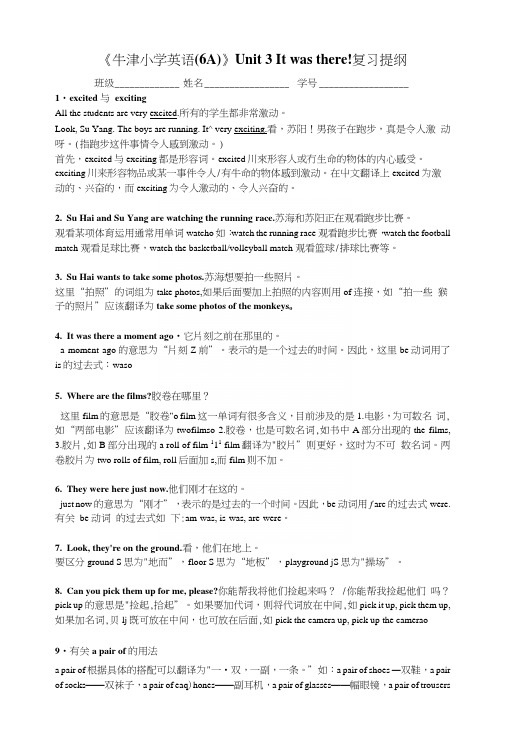
《牛津小学英语(6A)》Unit 3 It was there!复习提纲班级_____________ 姓名_________________ 学号__________________1・ excited 与excitingAll the students are very excited.所有的学生都非常激动。
Look, Su Yang. The boys are running. It^ very exciting.看,苏阳!男孩子在跑步,真是令人激动呀。
(指跑步这件事情令人感到激动。
)首先,excited与exciting都是形容词。
excited川來形容人或冇生命的物体的内心感受。
exciting川来形容物品或某一事件令人/有牛命的物体感到激动。
在屮文翻译上excited为激动的、兴奋的,而exciting为令人激动的、令人兴奋的。
2.Su Hai and Su Yang are watching the running race.苏海和苏阳正在观看跑步比赛。
观看某项体育运用通常用单词watcho如:watch the running race观看跑步比赛,watch the football match 观看足球比赛,watch the basketball/volleyball match 观看篮球/排球比赛等。
3.Su Hai wants to take some photos.苏海想要拍一些照片。
这里“拍照”的词组为take photos,如果后面要加上拍照的内容则用of连接,如“拍一些猴子的照片”应该翻译为take some photos of the monkeys o4.It was there a moment ago•它片刻之前在那里的。
a moment ago的意思为“片刻Z前”。
表示的是一个过去的时间。
因此,这里be动词用了is的过去式:waso5.Where are the films?胶卷在哪里?这里film的意思是“胶卷"o film这一单词有很多含义,目前涉及的是1.电影,为可数名词,如“两部电影”应该翻译为twofilmso 2.胶卷,也是可数名词,如书中A部分出现的the films, 3.胶片,如B部分出现的a roll of film 111 film翻译为"胶片”则更好,这时为不可数名词。
上海牛津六年级上6A各单元知识梳理

预初期末复习Module 1 Unit 1 family and relatives 单元重点1.关键词汇Relative :grandfather, grandmother, grandson, granddaughter, uncle, aunt, cousinFamily tree, family members :father, mother, son, daughter, brother, sisterplay games/football/badminton ;go shopping/swimming/cycling ;go to a restaurant/the park ;watch TV/a film ,only ,else ,classmate2.语言功能Asking for information 询问信息1)A :How many + 名词复数+ do you have ?B :I only have one……/ I have (number)……2)A :What (else)do you do with your + 名词?B :I always / usually / sometimes / never do sth. with my + 名词Introduction 介绍:This is ……/ These are ……Express good wishes 表示祝愿:Happy birthday !3. 语法要点1)频度副词always ,usually ,often ,sometimes 和never 在一般现在时中的用法:放在be 动词、助动词后面,放在行为动词前面。
She is often late for school .When do you usually do in the morning ?He usually goes to bed in the morning .1. 主格做主语,放在句首:I often go to the supermarket . (me)2. 宾格做宾语,放在动词、介词的后面:I sometimes go shopping with him (he)3. 形容词性物主代词做定语,放在名词前面:后面必须加名词Our classroom is very big and clean. (we)4. 名词性物主代词做主语、宾语、表语:后面不能加名词Is this her T shirt ?No ,hers is red . (she)That new flat is ours . (we)3) 一般现在时:主语除了是三单主语是第三人称单数I go to school on foot . She goes to school on foot .I don’t go to school on foot . She doesn’t go to school on foot .Do you go to school on foot ?Does she go to school on foot ?Yes ,I do . / No ,I don’t Yes she does . / No ,she doesn’t动词变化①以s ,x ,ch ,sh ,o结尾+es ;②以辅音字母+y结尾,去y+ies ;③have…hasModule 1 Unit 2 I have a good friend 单元重点1.关键词汇词性转换:friend n. ……friendly a. ……friendship n.help n. v. ……helpful a. ……helpless a.kind a. ……kindness n. ……kindly ad.pollute v. ……pollution n.discuss v. ……discussion n.use v. ……reuse v. ……useful a. ……useless a.angry a. ……angrily ad. ……anger n.visit n. v. ……visitor n.词组:talk to/with sb talk about sth = discuss sthlike to do/doing enjoy doingevery day every night/morning/afternoongo out at night walk to school = go to school on footbe together play togethereat one’s lunch share one’s foodhelp each other each other = one anotherhelp other people other people = othersbe late for ask sb about sthwork hard be kind toget angry get coldshare sth with sb tell lieslive in the USA visit Garden Cityfor the first time on Saturdaya friend of the Earth pick up rubbishlook after = take care of = care for all the things around uspollute the environment air/land/water/noise pollutionkeep ……clean keep + adj; keep quiteput rubbish into rubbish bins leave rubbishtell sb to do ; tell sb not to do ask , invite , allow , want sb not to dowant to be want/agree/decide/hope/offer/try/manage + to do promise to do ; promise not to do discuss sth with sb2.语言功能1)A :Thank you! B :Not at all./ You’re welcome./ It’s a pleasure./ That’s all right.2) A :We want to look after the environment . B :All right .3.语法要点1)We like to + v ……together2)be + adj :She is always naughty/clever/friendly/helpfui比较:She always gets angry . She never tells lies.3) A:Where have you been ? B:I have been to ……A:Have you been to ___________yet?B: yes, I have just /already been to ______./Y es , I have just /already been there.No, I haven’t been to ______yet. / no, I haven’t been there yet.4) we promise to .../we promise not to ..Module 1 unit3 spending a day out together1. 关键词汇词性转换happy a.------- happily ad. -------unhappy a.sand n. ---------sandy a.sun n. -------sunny a.cloud n.-------- cloudy a. wind n. ------windy a.rain n. ------rainy a. snow n. ------snowy a.luck n. ------lucky a. ------luckily ad. ------ unlucky a.act v. ------activity n. ------ actor n. ------ actress n. ------action n.collect v. ------ collection n.important a. ------importance n.special a. ------specially ad.词组:At weekends= at the weekend on weekdaysBe far away from be nearIn sandy bay/ sunny town on lucky islandCome with sb space museumA photo of me the students of class threeBuy tickets eat ice creamHave a barbecue/a picnic/lunch/dinner spend a holidayFly tickets ride bicycles= cycleMake sandcastle collect shellsMake an album come backPlan a visit plan to do sthCome back make some notesGet there get to ShanghaiMy sixtieth birthday her ninth birthdayHave a big birthday party have a good time = enjoy oneselfPlay with sb get enough food for the party2. 语言功能1)A: Let’s go to Ocean Park . B : That’s a good idea./All right.2)A: Where have you been in -----? B: I have been to ----in---with sb3) A: Which place shall we visit? B: Shanghai MuseumWhen shall we go there ? On SaturdayWhat time ---? 9 o’clockHow are we going to get there ? By undergroundHow much does it cost? = How much is it ?How much do they cost ? = How much are they ?3. 语法要点1) 表示建议How about + n/doing? How about playing badminton?What about + n/doing? What about playing badminton?Why not + do ? Why not play badminton.Why don’t you + do? Why don’t you play badminton?Let’s + do . Let’s play badminton.2) 现在进行时表示说话正在发生的动作或目前这一阶段正在进行的动作’s nine.搭配Module 2 Unit 4 What would you like to be 单元重点1词性转换:secret a.-------secretary n .teach n.-------teacher n .drive n.-------driver n .work v .------worker n .safe n .a.-----safely ad.------safety a.fire n.-------fireman n.post .v.-----postman n. ----postage n-----poster ncook v.------cook n.-------cooker n.2词组:1.find out Please find out who broke the window .find At last he found his English book.look for Alice is looking for her new watch .2.interview sb interview her3.start work4.finish work5.put sth together6.stick sth on a display board7.in the morning/afternoon/eveningOn a cold morning on Sunday afternoon/on the evening of July 18.make our city a safe placemake sth for sb =make sb sth make a cake for us =make us a cakemake sb+adj. make me happy9.eight years old3.语言功能A.表达愿望(wishes)Would you like to be a policeman ?—Yes, I would./ No, I would not.B. 陈述原因(give reasons)Why……?Because……4.语法要点:A.I’d=I would ; would not =wouldn’tB. would like to 与want to 的转换I would like to be a nurse .=I want to be a nurse.I wouldn’t like to be a nurse.=I don’t want to be a nurse .Would you like to be a nurse ?=Do you want to be a nurse ?She would like to be a nurse.=She wants to be a nurse .She wouldn’t like to be a nurse.=She doesn’t want to be a nurse .Would she like to be a nurse?=Does she want to be a nurse ?5.职业A cook cooks food for people.A secretary takes notes and answers phones.A dentist looks after people’s teeth.A doctor makes sick people better.A nurse helps make sick people better.A pilot flies a plane.A shop assistant sells things to people.A factory worker makes things in a factory.A fireman puts out fires.A bank clerk receives money and gives money in a bank.Module 2 Unit 5 Open Day 单元重点1.词性转换:1. enter v.----------entrance n.2. music n. -------musical a.3.final a.--------finally ad.4.invite v.------invitation n.5.act v.--------activity n.6. different a.----difference n.2.词组:1.arrive at (小)in(大)+地点get to +地点到达某地Arrive at school arrive in Shanghai get to Shanghai reach Shanghai比较:arrive home/here/there get home reach home2.meet sb at +地点meet Mary at the entrance3.visit sb/sp. Visit Mr. Wang/visit Beijing4.look at sb/sth look at class project/look at me5.listen to sb/sth listen to him /listen to the music6.the Arts and Crafts room English club noticeboard7.in the library in the hall in the music room in classroom 6A8.have tea and cakes9.want sb to do sth want us to make notes10.welcome sb welcome the parents11.on the open day 12.in different places13.on the second floor 14.teachers’office15. invite sb to do sth invite Lily to have a picnic16.take some photos complete the article17. have a good time =have a great time =enjoy oneself=enjoy one’s time3.语言功能:A.询问信息(Asking for information)--When What time Where WhatWhere will kitty be? Kitty will be in the music room.B.用副词表达事情得进展顺利。
牛津6A Unit3教案
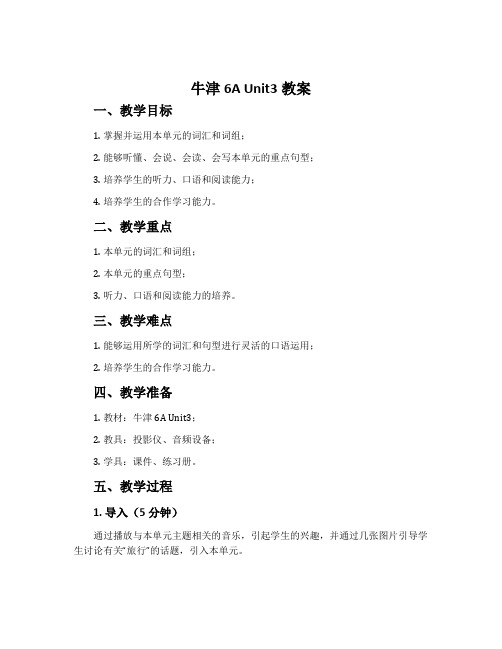
牛津6A Unit3教案一、教学目标1.掌握并运用本单元的词汇和词组;2.能够听懂、会说、会读、会写本单元的重点句型;3.培养学生的听力、口语和阅读能力;4.培养学生的合作学习能力。
二、教学重点1.本单元的词汇和词组;2.本单元的重点句型;3.听力、口语和阅读能力的培养。
三、教学难点1.能够运用所学的词汇和句型进行灵活的口语运用;2.培养学生的合作学习能力。
四、教学准备1.教材:牛津6A Unit3;2.教具:投影仪、音频设备;3.学具:课件、练习册。
五、教学过程1. 导入(5分钟)通过播放与本单元主题相关的音乐,引起学生的兴趣,并通过几张图片引导学生讨论有关“旅行”的话题,引入本单元。
2. 新课教学(30分钟)2.1 单词及词组教学教师呈现本单元的词汇并进行激活,教师可以采用图片、实物等多种形式进行教学。
通过互动游戏、配对活动等让学生积极参与。
2.2 句型教学教师呈现本单元的重点句型并进行操练。
教师可以通过示范、问答等方式引导学生使用句子进行对话练习。
然后学生进行小组活动,互相询问对方关于旅行计划的问题,并向全班汇报。
3. 听力训练(15分钟)教师播放本单元的听力材料,并给出相应问题。
学生们仔细倾听并回答问题。
教师随机选择学生回答问题,并进行点评和反馈。
4. 口语练习(15分钟)学生们分成小组,每个小组选择一个旅行目的地,并在规定的时间内进行讨论和准备,制定旅行计划。
然后每个小组派一名代表向全班进行演讲,介绍自己小组的旅行计划。
其他学生可以进行提问。
5. 阅读训练(15分钟)教师发放本单元的阅读材料,并给出相应的问题。
学生们阅读材料,并回答问题。
教师可以选择学生回答问题并给予点评。
6. 小结(5分钟)教师对本节课的重点内容进行小结,并要求学生复习本单元的词汇和句型。
六、作业布置1.完成本单元的课后习题;2.准备下节课的展示和讨论。
七、课后反思本节课通过多种教学方法和活动形式,培养了学生们的听力、口语和阅读能力。
牛津小学英语6a Unit 3

第七周
课次(本周第几课时)
第一课时
授课课题
Unit 3 It was there
教学基本内容
Part F&G
教学目的
1.通过复习熟练掌握本单元所学的单词和句型。
2.了解字母组合ear和ere在单词中的读音。
2.会唱歌曲Where’s my diary?
教学重点及难点
1.过复习熟练掌握本单元所学的单词和句型。
板书设计
Unit 3 It was there
Where is…?Where are…?
It’s in/on….They’re in/on….
It isn’t there now.They aren’t there now.
It was there a moment ago. They were there just now.
1.出示课文挂图。
T: What are they doing?
S: They’re running.
T: Yes, they are having a running race.Learn : race
T: The students are very excited.Learn: excited
T: What are Su Hai and Su Yang doing?
执行情况与课后小结
年级:六年级主备者:备课时间:2010.9.28
周次
第五周
课次(本周第几课时)
第二课时
授课课题
Unit 3 It was there
教学基本内容
Part A
教学目的
1.能听懂、会说、会读和会拼写单词:excited, a race. exciting, a pocket. take photos, look for, just now.
牛津小学英语6A第三单元unit3知识点整理及练习
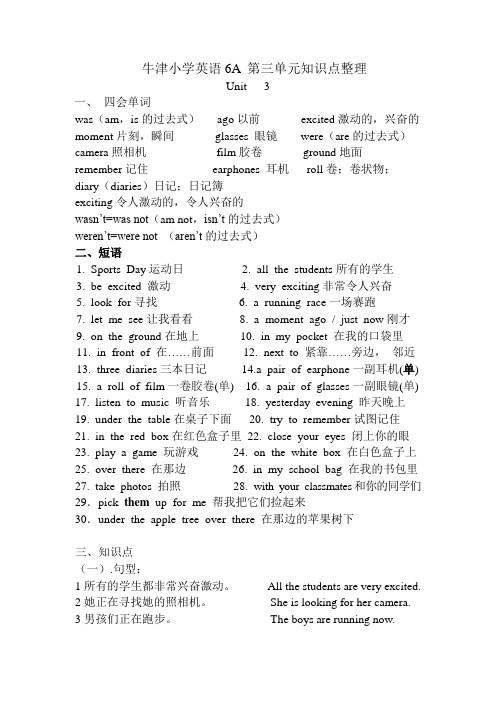
牛津小学英语6A 第三单元知识点整理Unit 3一、四会单词was(am,is的过去式)ago以前excited激动的,兴奋的moment片刻,瞬间glasses 眼镜were(are的过去式)camera照相机film胶卷ground地面remember记住earphones 耳机roll卷;卷状物;diary(diaries)日记;日记簿exciting令人激动的,令人兴奋的wasn’t=was not(am not,isn’t的过去式)weren’t=were not (aren’t的过去式)二、短语1. Sports Day运动日2. all the students所有的学生3. be excited 激动4. very exciting非常令人兴奋5. look for寻找6. a running race一场赛跑7. let me see让我看看8. a moment ago / just now刚才9. on the ground在地上10. in my pocket 在我的口袋里11. in front of 在……前面12. next to 紧靠……旁边,邻近13. three diaries三本日记14.a pair of earphone一副耳机(单) 15. a roll of film一卷胶卷(单) 16. a pair of glasses一副眼镜(单) 17. listen to music 听音乐18. yesterday evening 昨天晚上19. under the table在桌子下面20. try to remember试图记住21. in the red box在红色盒子里22. close your eyes 闭上你的眼23. play a game 玩游戏24. on the white box 在白色盒子上25. over there 在那边26. in my school bag 在我的书包里27. take photos 拍照28. with your classmates和你的同学们29.pick them up for me 帮我把它们捡起来30.under the apple tree over there 在那边的苹果树下三、知识点(一).句型:1所有的学生都非常兴奋激动。
牛津沪教版六年级上6AUnit3-Unit4重要知识点复习
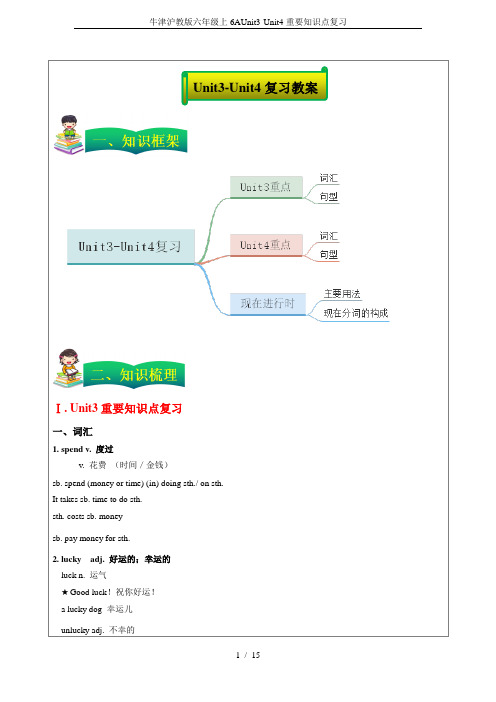
Unit3-Unit4复习教案Ⅰ. Unit3重要知识点复习一、词汇1. spend v. 度过v. 花费(时间/金钱)sb. spend (money or time) (in) doing sth./ on sth.It takes sb. time to do sth.sth. costs sb. moneysb. pay money for sth.2. lucky adj. 好运的;幸运的luck n. 运气★Good luck!祝你好运!a lucky dog 幸运儿unlucky adj. 不幸的4) 当动词为重读闭音节或以重读闭音节结尾时,要重复词尾的辅音字母,再加-ing,如:running, stopping, swimming, beginning 等.★现在进行时常用的时间状语有:now, nowadays, at the moment, these days等。
三、句型(1)肯定句:be + Ving I am listening to the music.(2)否定句:be + not +Ving I am not listening to the music.(3)一般疑问句:把Be动词提到句首Are you listening to the music?(4)特殊疑问句:疑问词+be+主语+Ving What are you doing?(当疑问词作主语时其结构为):疑问词+be+Ving Who is listening to the music?【课堂小练】I.练习一:现在分词的变形(错误率:掌握情况:)Model: do→ doing1. talk __________2. make __________3. study __________4. sing __________5. picnic __________6. run __________7. begin __________ 8. go __________ 9. write __________10. put __________ 11. lie __________ 12. die __________II.练习二:Fill in the blank in its proper tense.(错误率:掌握情况:)1. __________ your mother __________ rooms every day? (clean)2. A: Where __________ John? (be)B: He __________ a model ship in his room. (make)3. It’s already six o’clock in the afternoon. But those boys __________ (still play) computer games in thebet-bar.4. A: What __________ you __________? (do)B: I __________ (read) today’s newsp aper.5. When __________ your first class __________? (begin) -At 8:05.III.Choose the best answer (选择) (错误率:掌握情况:)( ) 1. _______________ c an fly a plane in the sky.A. A businessmanB. A firemanC. A cookD. A pilot ( )2. Mr Wang wants to make sick people feel ________________ .A. goodB. wellC. betterD. best ( )3. Samuel Han_______________ w ork at eight o'clock in the morning.A. startedB. startsC. finishedD. finish( )4. What ______________ your uncle do?A. doB. doesC. doingD. to do ( )5. I would like to be a teacher. That's ________________ I would like to be.A. howB. whatC. whenD. where ( )6. Mr Wang is a cook. He likes to cook delicious food _______________ people.A. withB. toC. forD. about ( )7. —How old are you?A. I am twenty-firstB. I am twenty-one year oldC. I am twenty-one years oldD. I am twenty-first years old( )8. —Why do you like this new book?—____________ it is very interesting and it is very useful.A. AndB. ButC. OrD. Because ( )9. Can you _______________ the person who stole(偷) the woman's bag?A. findB. lookC. look forD. find out ( ) 10. —Do you like your job now?A. Yes, I wouldB. No, I wouldn'tC. Yes, I doD. No, I doesn't ( ) 11. Would you like to be _____________ English teacher?A. anB. aC. theD./( )12. My uncle is a good worker. _______________ o ften works very quickly.A. SheB. HerC. HimD. He ( )13. ___________ you have time, please come to my birthday party.A. IfB. WhyC. Why notD. How ( ) 14. We usually begin our first class ________________ 8 o'clock ___________ the morning.A. at; onB. on; outC. in; atD. at; in ( )15. ___________ do you usually work from Monday to Friday?A. How longB. How oldC. How oftenD. How farYou found out that she was the biggest mouth ever and loved to j to conclusions without knowing much. She behaved like a 16-year-old kid when she was like 25. You didn't know why but every time you s her, you didn't want to move close to her.I personally don't like to have prejudice about people. However, I always take a disliking to really rude people. I must admit disliking a certain few after I've met a handful of people. Most of the time it's because they are too proud, stupid, rude, arrogant and annoying. I feel it is okay to dislike someone for whatever r .A bad first impression is really t . It's just human nature, sometimes you dislike them to begin with, but after you know them you like them.D. Answer the questions (回答问题)All students need to have good study habits. When you have good study habits, you learn things quickly. You also remember them easily.Do you like to study in the living room? This is not a good place, because it is usually too noisy. You need to study in a quiet place, like your bedroom. A quiet place will help you only to think about one thing.When you study, do not think about other things at the same time. Only think about your homework. If you do this, you will do your homework more quickly, and you will make fewer mistakes.Good study habits are very important. If you do not have them, try to learn them, if yours are already good,try to make them better.1.How do you learn things when you have good study habits?2.When do you remember things easily?3.What shouldn't you do at the same time when you study?4.What must you only think about when you study?5.If you do not have good study habits, what must you do?1.默写两个单元的单词和词组。
- 1、下载文档前请自行甄别文档内容的完整性,平台不提供额外的编辑、内容补充、找答案等附加服务。
- 2、"仅部分预览"的文档,不可在线预览部分如存在完整性等问题,可反馈申请退款(可完整预览的文档不适用该条件!)。
- 3、如文档侵犯您的权益,请联系客服反馈,我们会尽快为您处理(人工客服工作时间:9:00-18:30)。
小学英语标准教材
六年级英语:牛津6A Unit 3知识点整理(教学实录)
Learning English is conducive to understanding the customs and culture of other
countries, reading foreign books, etc.
学校:______________________
班级:______________________
科目:______________________
教师:______________________
--- 专业教学设计系列下载即可用 ---
六年级英语:牛津6A Unit 3知识点整理(教
学实录)
6a unit three
[词汇]
was (am,is的过去式)excited 激动的,兴奋的
moment 片刻,瞬间ago 以前
were (are的过去式)just now 刚才
mobile phone 手机,手提电话glasses 眼镜
sports day 体育运动节running race 赛跑
camera 照相机exciting 令人激动的,令人兴奋的
film 胶卷ground 地面
earphone 耳机diary 日记,日记簿
cd walkman 光盘随身听roll卷,卷状物
remember 记住,记得weren’t=were not
[词组]
1. sports day 体育运动节
2. all the students 所有的学生
3. (sb) be excited 感到激动/兴奋
4. watch the running race 看赛跑
5. want to do sth. 想要做某事
6. take photos 照相
7. look for 寻找8. (sth) be exciting 令人兴奋
9. let sb. do sth. 让某人做某事10. a moment ago 刚才
11. let me see. 让我看看。
12. just now 刚才
13. on the ground 在地上14. pick it/them up for sb. 为某人捡起它(们)
15. a mobile phone 一只手机16. a pair of glasses 一副眼镜
17. a cd walkman 一个光盘随身听18. a roll of film 一卷
胶卷
19. try to remember 努力记住20. close your eyes 闭上你的眼睛
[重难点分析]
1. all the students are very excited. 所有的学生都很兴奋。
it’s very exciting. 它很激动人心。
excited意为“兴奋的,激动的”,通常用来形容人们的心情。
而exciting则是“令人激动的,刺激的”,通常用来形容某事物或事件。
如:
i am excited to see my old friend again. 再次见到老朋友,我很激动。
he tells me an exciting story every day. 他每天给我讲一个令人激动的故事。
2. su hai wants to take some photos. 苏海想要拍些照片。
take photos 拍照片
want to do sth. 想要做某事。
例如:
i want to play basketball with jim. 我想要和jim一起打篮球。
she wants to come to my birthday party. 她想要来参加我的生日聚会。
3. she is looking for her camera. 她正在寻找她的照相机。
“look for”表示“寻找”,强调找的动作,不强调是否找到。
find表示“找到”,强调结果,常与can, can not连用。
例如:i’m looking for my pen, but i can’t find it.我正在找我的钢笔,但是我没有找到。
4. it was there a moment ago. 刚才它还在那儿。
they wer here just now. 他们刚在还在这儿的。
1) a moment 瞬间,一会儿工夫。
a moment ago意为“刚才”,同义词组为just now。
和moment连用的短语有:with a moment等一会儿;in a moment马上,立刻。
例如:
— it’s time to go to school. 该去上学了。
—wait a moment.
等一会儿。
2) a moment ago和just now都要与一般过去时连用。
3) was 是am和is的过去式,are的过去式是were。
was和were 都可以表示过去的状态。
例如:
i was a little girl three years ago. 三年前我还是个小女孩。
you were my teacher at that time. 那个时候你是我的老师。
4) ago通常用在一段时间后,表示过去的时间。
如:
five days ago 五天前 long ago很久以前
5. a pair of glasses 一副眼镜新课标第一网
类似的词组有:a pair of shoes一双鞋,a pair of trousers 一条裤子,一般是看作单数。
例如:
there is a pair of trousers on the bed. 床上有一条裤子。
this pair of shoes looks nice. 这双鞋看上去很好看。
XXX图文设计
本文档文字均可以自由修改。
